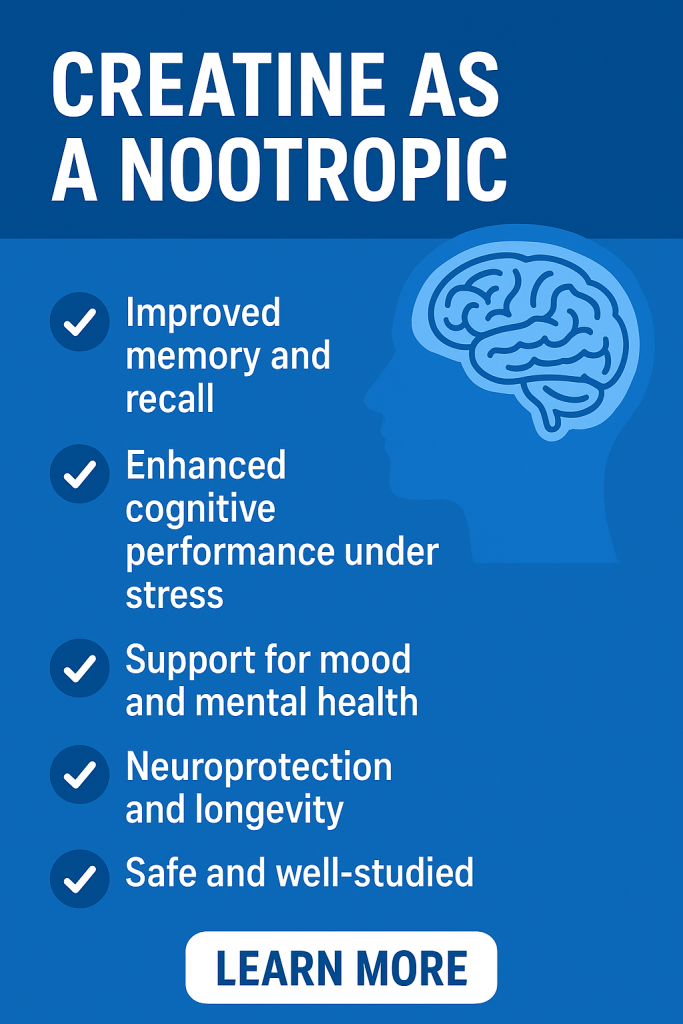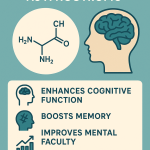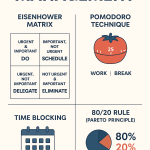Introduction: Why Creatine as a Nootropic Matters
Creatine as a nootropic is quickly becoming one of the most exciting discoveries in cognitive science. Most people recognize creatine as a supplement for building muscle and improving gym performance, but its benefits go far beyond the weight room. Studies show that creatine as a nootropic can boost memory, enhance mental energy, and support sharper focus under stress.
By improving brain energy metabolism, creatine supports mental clarity for students, professionals, gamers, and older adults. This guide will break down how creatine as a nootropic works, the proven benefits, recommended dosage, and how it stacks up against other nootropics.
What is Creatine?
Creatine is a compound that occurs naturally in the body and in foods like red meat and fish. About 95% of the body’s creatine is stored in muscles, where it powers explosive energy for lifting, sprinting, and training. But here’s what’s often overlooked: the brain also stores creatine, and it relies on it for cognitive function.
Creatine is synthesized in the liver, kidneys, and pancreas from amino acids. It then acts as a “battery charger” for ATP, the molecule that fuels almost every cellular process. Just like muscles, the brain relies on ATP for energy — and this is where creatine as a nootropic comes in.
How Creatine as a Nootropic Works in the Brain
Brain Energy Demands and Creatine’s Role
The human brain consumes about 20% of the body’s total energy while at rest. That’s more than any other organ. Neurons fire electrical signals constantly, which requires enormous amounts of ATP. Creatine as a nootropic provides backup fuel by recycling ATP, preventing mental fatigue during tasks that demand high concentration.
The Phosphocreatine Shuttle
Inside the brain, creatine exists as phosphocreatine. During intense activity, phosphocreatine donates a phosphate group to ADP, creating ATP. This cycle ensures neurons maintain a steady energy supply, allowing you to stay focused, process information quickly, and retain new knowledge.
Neuroprotection Benefits
Oxidative stress and mitochondrial dysfunction are linked to neurodegenerative diseases like Alzheimer’s and Parkinson’s. Research suggests that creatine as a nootropic helps stabilize mitochondria, reduce oxidative damage, and support overall neuron survival.
Cognitive Benefits of Creatine as a Nootropic
Improved Memory and Recall
A groundbreaking study published in Proceedings of the Royal Society B (Rae et al., 2003) found that creatine as a nootropic improved working memory and intelligence test scores in young adults. Memory enhancement is especially pronounced during mentally demanding situations, such as studying or multitasking.
Enhanced Focus Under Stress
When you’re sleep-deprived or under mental strain, brain performance normally drops. However, research from the University of Sydney demonstrated that creatine supplementation preserved cognitive ability in participants who went without sleep. This makes creatine as a nootropic particularly valuable for shift workers, military personnel, and students pulling all-nighters.
Mood and Mental Health Support
A review in Neuroscience & Biobehavioral Reviews found that creatine supplementation may help reduce depressive symptoms, likely due to its role in improving brain energy metabolism. Early trials suggest that creatine could serve as an adjunct therapy for mood disorders.
Neuroprotection and Longevity
Animal research and preliminary human trials suggest creatine may protect against neurological conditions by buffering cellular stress. While long-term trials are still needed, the evidence points to creatine as a promising neuroprotective agent.
Creatine as a Nootropic Compared to Other Cognitive Enhancers
Creatine vs. Caffeine
Caffeine provides a quick energy boost, but it often comes with side effects like jitters, increased heart rate, and energy crashes. Creatine as a nootropic, on the other hand, offers steady cognitive support without overstimulation.
Creatine vs. L-Theanine
L-Theanine promotes relaxation and calm focus, while creatine ensures your brain cells don’t run out of fuel. When combined, these two nootropics can deliver balanced alertness and productivity.
Creatine in Nootropic Stacks
Many biohackers include creatine in their nootropic stacks because it synergizes well with compounds like:
- Bacopa Monnieri (memory and learning)
- Rhodiola Rosea (stress resilience)
- Omega-3 fatty acids (brain cell structure and signaling)
This makes creatine a flexible and affordable addition to any cognitive-enhancement routine.
Dosage and Safety of Creatine as a Nootropic
How Much Creatine to Take for Cognitive Benefits
Most studies recommend 3–5 grams of creatine monohydrate daily. While athletes sometimes load creatine at higher doses initially, this isn’t necessary for cognitive effects. The brain takes weeks to build up creatine reserves, so consistency is more important than high doses.
Safety and Side Effects
Creatine is one of the most researched supplements worldwide. It’s safe for long-term use in healthy individuals, with minimal side effects. Some users experience mild water retention, but this is mostly within muscle cells and harmless.
Who Should Consider Creatine as a Nootropic?
- Students preparing for exams or learning new material.
- Professionals under heavy workloads.
- Gamers who require sustained focus for hours.
- Older adults seeking to maintain memory and prevent decline.
- Sleep-deprived individuals like shift workers or parents.
Scientific Studies on Creatine as a Nootropic
- Rae et al. (2003): Demonstrated improved memory and reasoning in healthy young adults supplementing creatine.
- McMorris et al. (2006): Found that creatine preserved mental performance during sleep deprivation.
- Allen (2012): Suggested creatine supplementation may reduce depressive symptoms.
- Avgerinos et al. (2018): A systematic review confirmed creatine’s positive impact on memory and executive function.
- Gualano et al. (2010): Found potential benefits for patients with mood disorders and cognitive decline.
FAQs About Creatine as a Nootropic
Is creatine just for athletes?
No. While athletes popularized creatine, research clearly shows creatine as a nootropic benefits memory, focus, and mental clarity in non-athletes as well.
How long does it take for creatine to work in the brain?
Unlike caffeine, creatine is not instant. It may take 2–4 weeks of consistent use before you notice cognitive improvements.
Can creatine improve IQ?
Creatine won’t suddenly raise IQ, but studies show it can improve working memory, reasoning, and mental stamina, which support higher cognitive performance.
Is creatine safe for older adults?
Yes, creatine is safe for older adults and may help slow age-related cognitive decline. Always consult a doctor before starting supplements.
Practical Tips for Using Creatine as a Nootropic
- Take 3–5 grams daily, consistently.
- Use creatine monohydrate (the most researched form).
- Mix into smoothies, shakes, or water for convenience.
- Pair with brain-friendly foods like fish, nuts, and leafy greens.
- Stack with caffeine + L-Theanine for productivity, or Bacopa for learning and memory.
Myths and Misconceptions About Creatine as a Nootropic
Myth 1: Creatine is only for bodybuilders.
Truth: Studies prove creatine improves brain performance in people who never step into a gym.
Myth 2: Creatine causes kidney damage.
Truth: Decades of research show creatine is safe for healthy individuals when taken at recommended doses.
Myth 3: Creatine is a stimulant.
Truth: Creatine does not stimulate the nervous system like caffeine. Instead, it fuels energy metabolism inside brain cells.
Outbound Resource
Inbound Resource
👉 Explore more natural health insights in our Health & Wellness section.
Conclusion: Why Creatine as a Nootropic is Essential
Creatine as a nootropic is one of the most underrated supplements available today. Backed by decades of research, it improves memory, enhances focus under stress, supports mood, and protects long-term brain health. Unlike stimulants, creatine provides steady, reliable energy for your brain without negative side effects.
For students, professionals, gamers, and anyone looking to boost cognitive performance naturally, creatine as a nootropic deserves a permanent spot in your daily wellness routine. Affordable, safe, and proven — it’s not just a gym supplement, but a true brain booster.



